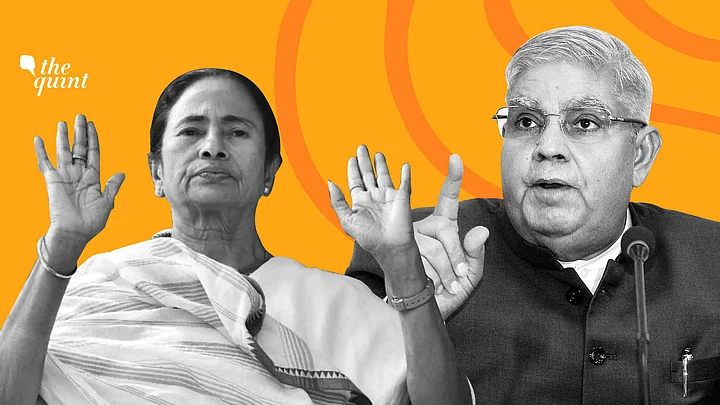One politician has stood out amidst the protests over the central government railroading the passage of the Citizen Amendment Act (CAA) and deciding to implement a National Register of Citizens (NRC). Though it has been largely spearheaded by angry students in universities across the country, in West Bengal, the push-back against the controversial law has been almost institutionalised by chief minister Mamata Banerjee.
After days of violence and arson in the state, on Monday, Mamata led a gigantic rally against CAA-NRC in Kolkata, delivering rousing speeches and vowing that the new law would come to Bengal over her dead body.
Delhi Has Ignored Calcutta Protests, Dhankhar Has Not
The BJP-led central government has watched in silence Mamata’s vociferous and spectacular stance over CAA-NRC. Weaponised, the two instruments will likely result in the disenfranchisement of thousands of Muslims, who account for 27 per cent of the population of the state.
But Jagdeep Dhankhar, the man chosen by the central government to be Governor of Bengal, has not been silent. The former Supreme Court lawyer and member of Parliament has been furiously tweeting his disapproval, “anguish”, shock and horror at the chief minister’s defiance against the CAA and the NRC.
He called her rally “unconstitutional and inflammatory”, and said that the advertisements proclaiming her refusal to implement CAA-NRC in the state was also unconstitutional, as public money could not be used for such campaigns.
Since then, curt letters have been exchanged between the Governor and the chief minister, with each side urging the other not to violate their “constitutional” duties. And while Dhankhar has railed on Twitter, the state administration has snubbed him unceremoniously.
Mamata Government Repeatedly Snubbing the Governor
When the Governor sought to be briefed by the state chief secretary and the director general of the police on the unrest in the state over CAA, neither turned up. On Tuesday Mamata kept him waiting all day and did not show up to give him an update on the situation.
Though Dhankhar has been doing his best to portray Mamata as a rogue chief minister, and one with little control over the law and order situation in the state, his own tweets hardly do him proud. On December 17, he tweeted: “Citizenship Amendment Act has NO IMPACT WHATSOEVER ON ANY CITIZEN OF INDIA and none has anything to worry regarding this act. It is balm to those who have faced years of persecution outside, have no other place to go except India.”
The (ungrammatical) tweet seemed more like something that a spokesperson of the ruling party at the Centre might have shot off rather than a statement that befits the constitutional (and ceremonial) head of a state government. Mamata Banerjee’s Trinamool Congress has, of course, long accused Dhankhar of being a surrogate of the BJP.
Ever Growing Rift Between Mamata and Dhankhar
The tension between the Governor and the state government has been simmering for a long time. Dhankhar took over as Governor of West Bengal in July, just a few months after the general elections, in which the BJP did dramatically well in the state, and the TMC appeared to have lost significant ground. It was clear that the party would now go all out to wrest Bengal in the 2021 Assembly elections. In fact, some political watchers said that it could try and topple the government even before that.
In such a scenario, Mamata would have viewed any Governor with suspicion—as someone who could be used by the Centre to destabilise her government. Unfortunately, Dhankhar’s words and actions haven’t exactly allayed that suspicion. He has used every opportunity to needle Mamata and her administration.
In September, when Union minister Babul Supriyo was heckled and gheraoed by students of Jadavpur University in Kolkata, Dhankhar rushed to the spot with a police force to rescue him. He later said that the state had poor control over law and order. In the wake of the WhatsApp hacking controversy, when Mamata said that her phone too may have been tapped, Dhankhar said that politicians, business people and others had told him that, in fact, the state government was tapping their phones.
It Is Advantage Mamata at This Point
Again, earlier this month, TMC legislators alleged that the Governor was trying to stall important legislations such as the West Bengal State Commission for SC & ST Bill by not putting his signature on them.
One TMC leader has called him an “agent of the BJP”. The state government, too, has ignored and snubbed Dhankhar when possible. On two occasions, he was denied permission to use a chopper, and he alleged that he had been blacked out by TV cameras during a durga Puja carnival that Mamata hosted.
The recent flashpoint between the Governor and the chief minister is far more grave, of course. Dhankhar is openly terming Mamata’s opposition to the CAA unconstitutional. And Mamata has been challenging the Centre to try and oust her over her opposition to CAA-NRC. The irony is that for the first time since her party’s underwhelming performance in the general elections, Mamata seems energised, larger than life, controlling and directing the narrative rather than letting others corner it. CAA and NRC have given her a cause, a reason to hit the streets once again and mobilise the masses — which is what she does best.
At this point, the chief minister’s antagonist in Raj Bhavan is looking petulant and powerless. In the tussle between the two, it’s advantage Mamata right now.
(Shuma Raha is a journalist and author based in Delhi. Her novel, The Swap, was published this month. She tweets at @ShumaRaha. This is an opinion piece and the views expressed above are the author’s own. The Quint neither endorses nor is responsible for the same.)
